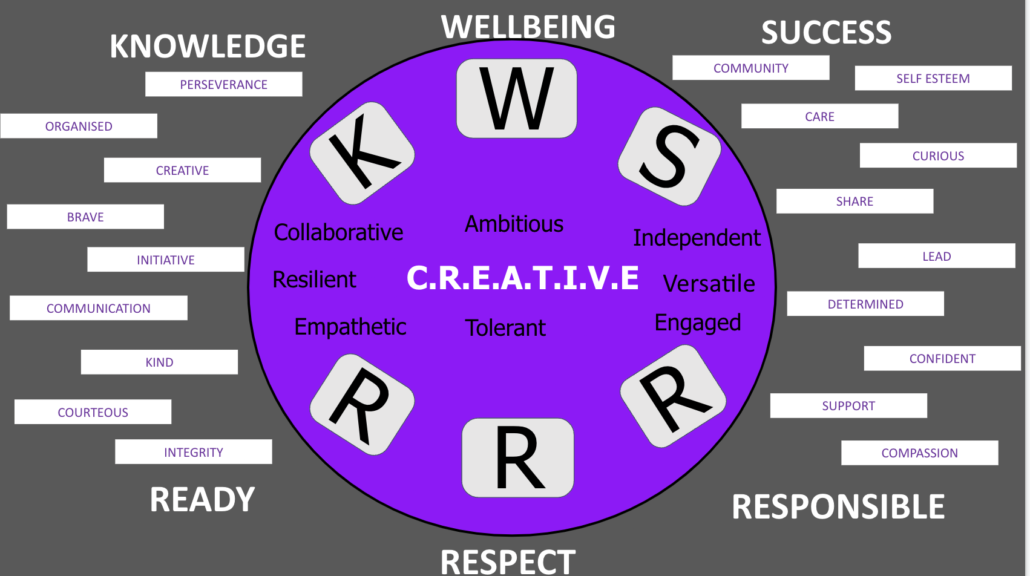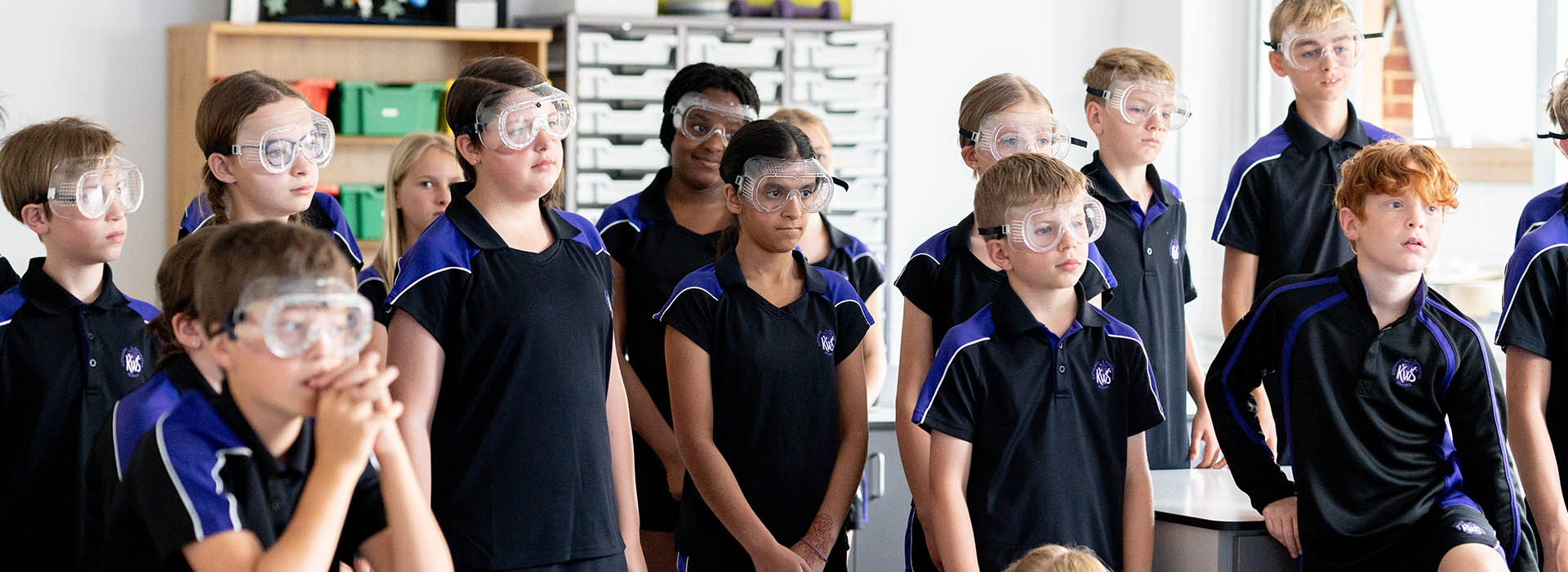Character Development
Our evidence based Character Curriculum can be broadly described as our approach to developing a set of values, attitudes, skills and behaviours within our students to support their development and contribute to their success whilst at KWS and into adult life.
The character we support our students to develop helps them navigate all aspects of secondary school life: education, relationships, behaviour and understanding. Our vision for each and every KWS student is for them to flourish in their lives, to intelligently choose the options to become the best possible version of themselves who will contribute and shape society through modelling outstanding character.
- Knowledge, Wellbeing and Success
- Ready, Respect, Responsible

Character Curriculum at KWS
Our evidence based Character Curriculum can be broadly described as our approach to developing a set of values, attitudes, skills and behaviours within our students to support their development and contribute to their success whilst at KWS and into adult life. The character we support our students to develop helps them navigate all aspects of secondary school life: education, relationships, behaviour and understanding. Our vision for each and every KWS student is for them to flourish in their lives, to intelligently choose the options to become the best possible version of themselves who will contribute and shape society, respect and support those apart of it through modelling outstanding character.
KWS student Character
At KWS our student’s character development falls into 2 categories:
- Knowledge, Wellbeing and Success (values) – these key values provide the foundation to the entire character development of our students and how they can achieve personally and academically.
- Ready, Respect, Responsible – these attributes are embedded in the teaching and learning in all areas of the curriculum, it guides our students how to conduct themselves in their learning and how to interact with students and staff.
How do we aim to develop the character of our students?
Year 7, 8 & 9
- Oracy: Inspirational Person Speeches, Debate
- Anti Bullying Ambassadors
- Art Appreciation
- GCSE Options
- Careers
- Arts, Culture and Society Award
- Current Affairs
- Independent Learning
- Mental Health Awareness
- Relationships
- PSHE Curriculum
- Character Curriculum (The Jubilee Centre)
- Read Aloud (add link to all about Read Aloud and the texts explored)
- Duke of Edinburgh
Year 10
- Work Experience
- Student Prefects (Appointed after the Spring Term)
- Student Prefects
- House Captains
- PSHE Curriculum
- Student Panels and Interviews
- Tours
- Careers
- Community Outreach
- Mentoring
Whole School
Student Council
Student Leadership Team
Restorative Practise
Reflection
Independent Learning
Equality, Diversity and Inclusion Events and Celebrations
Assemblies
Pastoral and Character Curriculum
Activities Week
Celebration Assembly
Form/ House assemblies
Oracy Assemblies
Period 7
Extra Curricular
Character Development within the Curriculum
As a commitment to the nourishment of our students character, and to fully support them in their development as members of society, it is imperative that students are able to identify and experience character development in the lessons they participate in every day: the curriculum. Focusing on character development as well as curriculum equips our students to develop their own personal reasoning on the importance of character, to become character literate and to partake in activities and learning that allows them to trial and error their own character development; empowering them to reflect on their own personal characters strengths and areas of improvement.
Across all subjects, students are challenged to demonstrate our values, the 3Rs.
Here is how some our subjects encourage our students to develop our students character:
Subject: Maths
- Collaboration (turn and talk each lesson to discuss different methods)
- Reasoning/oracy (explaining and articulating their method or reason).
- Reflection – when self-assessing their work at the end of the lesson – being self critical to self correct their wrong answer or ask for help if they are unsure where they went wrong.
- Reflection – RAG rating their work at the end of each lesson for achievement and effort.
- Compassion – listening and having an appreciation for each other’s answers and methods.
- Integrity – to give answers when called upon even if they are unsure if it is correct.
- Humility – if they are wrong, working out why they were and how to correct it.
- Resilience (problem solving)
- Independence (working on their own)
Subject: Humanities
- Students critically analyse sources for reliability
- Students are asked to “evaluate” issues in both geography and History; coming to a judgement with their opinion
- There are lots of evaluative tasks which aid planning for key evaluative questions
- Reflection – doing the RAG 1234. Reflecting on their successes of Key Assessment Tasks after each one and improving their ideas
- Activities which encourage students to stand in the shoes of people throughout History, and in different countries
- Humility in being encouraged to give answers even if they’re not certain of the answer. And in supporting other students in paired work if one student is weaker.
- Respect in the classroom as a core value.
- Citizenship through learning about other countries and how they are dealing with problems, and learning about the local and national problems in year 7 (geographically) and how we can go about solving them.
- Ensuring civility in discussion tasks which are highly controversial; respecting one another’s opinions and giving time to articulate viewpoints, welcoming challenge.
- Resilience in the face of challenging writing tasks.
- Confidence in giving answers when cold called by the teacher.
- Motivation in the face of revision tasks which can be perceived as boring. Training students in revision techniques which help to build their resilience.
Subject: Performing Arts
- Evaluation (individual/group)
- Reflection on the impact of words/ actions on others (lessons)
- Using stimuli
- Theatre trips
- Application of theatre to real life
- Recognising how music can influence society and vice versa
- Development of independent learning through project work
- Making connections between music and the social / demographic context
- Showing respect for cultures and difference through appreciation of performances
- Auditioning for school performances
- A willingness to discuss issues brought up by the time and place in which music is composed and/or performed
- Placing value on performance, creative work at whatever standard it exists
- Being an active audience member
- Auditioning for school productions
- Learning about different people in modern society
- Performing in front of peers (an audience)
- Inclusive and open mindedness to groups, subject matters and the work of others.
- Working with all members of the teaching group including small group working.
- Performing at local and regional events (such as James Marshall Foundation)
- Recognising the role of music in celebrating cultural diversity
- Working with all members of the teaching group
- Working as an ensemble
- Rehearsal Process
- Being resilient and recognising how perseverance supports skill development
- Confidence development through solo and/or small group performance
- Performance in front of an audience
- Be part of school productions (Winter Showcase, Spring Musical, Shakespeare Festival)
Subject: Modern Foreign Languages
- Develop Metacognitive skills, thinking skills, decoding language patterns
- Reflection – check written work, set targets, how to improve
- Respect – listen to others and learn from each other
- Awareness of the people and cultures of other countries – social situations
- Confidence – developing speaking skills – presentation, oracy and paired speaking
- Perseverance – challenging texts, tenses (many different forms)

